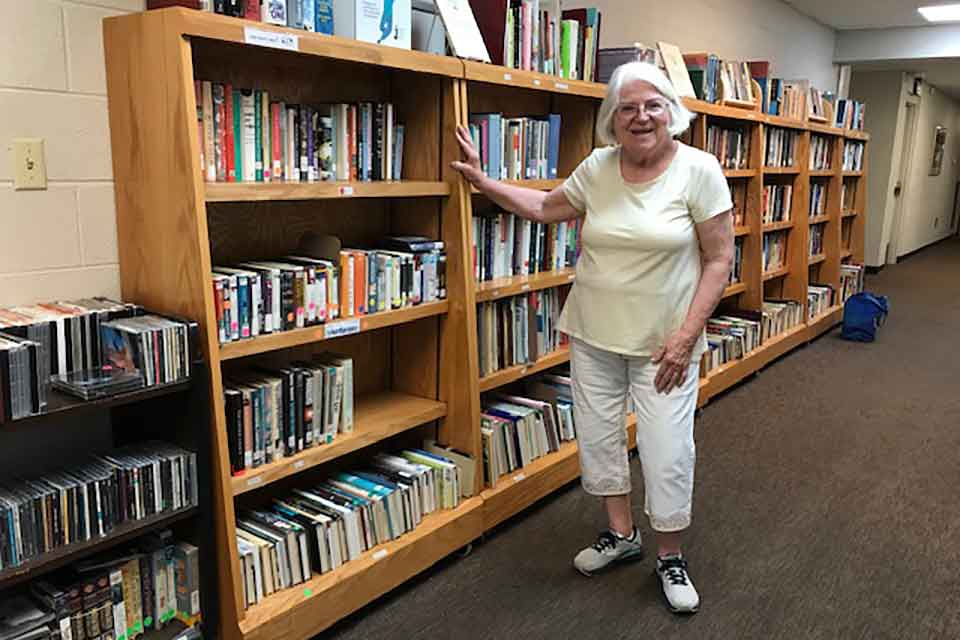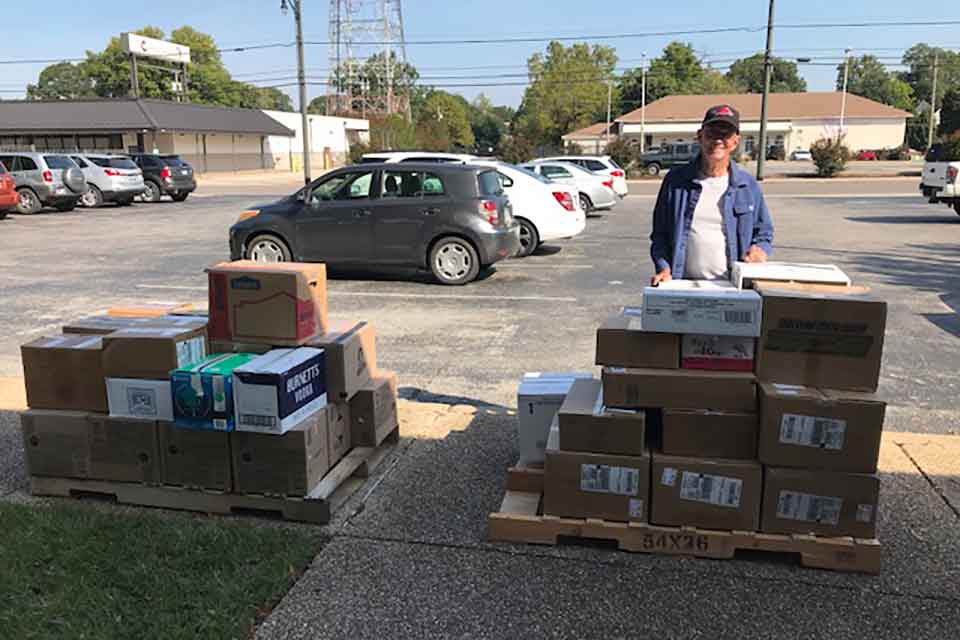Welcome news to those of us in the “Flyover Zone”: our reading habits are healthy and well served. The Jackson Madison County Public Library in Jackson, Tennessee, is one such example. Possessing 115,799 physical items and over one million electronic books, it is one of the larger West Tennessee libraries, and it purports to encourage communicating information, developing technology literacy, and connecting people. It has a total physical circulation of 216,807 and 71,885 patrons (Madison County has a little over 100,000 residents). Digital circulation has gone up since Covid and stands today at 143,709. The library has a northern branch, a Tennessee Room archive, and five “Little Free Libraries” across the city of Jackson. Its 2022 budget was $217,447 for digital and print materials, with $95,159 for print books and $111,115 for digital, $11,137 of which went to cassettes and DVDs that are still popular among patrons with less advanced technology. Dinah Harris, the library director since 2000, states that print books are slow to disappear and remain a vital part of the library. The use of electronic resources has only gone up by 15 percent since Covid and is plateauing at 40 percent. Printed books have a long and happy life in the flyover zone.
Libraries, whether located in the flyover zone or not, must repurpose their weeded and donated books. At the Jackson Madison County Public Library, spring and summer keep the library staff busy both before and after the end of the fiscal year. Books, audiovisual materials, magazines, and art are received in the book drop or donated in batches. The proverbial spring cleaning makes spring a busy season for donations. Books often come in batches after a death or a retirement, bringing in teachers’ and lawyers’ entire collections. Weeding is based on reading frequency. Literature, especially nonfiction, gets weeded every five years or less frequently if the books belong to the classics of fiction and poetry. Less than one-fortieth of the discarded books are sent to recycling on account of their poor condition. Children’s books are often donated in batches to local teachers. Bibles are given out for free. Then there is serious book repurposing.

The library’s branch of the national nonprofit organization called Friends of the Library started an annual sale decades ago. The increase in book donations in the past ten years and especially since the pandemic has changed the way in which the library handles used books. In 2016 the library undertook two new initiatives. It went from an annual book sale to a year-round book sale managed by “More Than Words,” a bookstore without walls that operates on an honor system. Locally sold books are shelved by genre (religious, fantasy, sci-fi, cookbooks, magazines, DVDs, CDs, and audiobooks). They start their journey at prices ranging from two dollars to ten cents and end their journey on a free table for adults and children. And the library contracted with ThriftBooks, the largest online used bookseller in the United States. Weeded and donated books start their repurposed career with a quick ISBN barcode scan for ThriftBooks eligibility, then Friends of the Library volunteers sort them. Some eligible titles are kept if there is an interest or if it makes business sense (the library pays shipping costs and receives half of the sales profits). Approximately five hundred books a month are boxed and picked up by a ThriftBooks truck.

The two book-repurposing programs, headed by Friends of the Library veteran member Sue Barnes, are growing. Sue “recruited” Allen Hardin in 2016. His only required qualification was to read a lot and to love books. A new volunteer, Mackdell Long, just joined them. Between the ThriftBooks and the “More Than Words” book sales, over ten thousand books are sold each year, resulting in approximately $8,000 in spare cash that supports library programs for children and summer programs (some seventy-nine youth and adult summer programs in 2022) and maintenance items not covered by the general budget such as cleaning carpets (very important during the pandemic) and fixing door locks.
Rescuing and sorting out books involves a myriad of decisions based on book knowledge, experience, and knowledge of the local readership. Allen reads history books, and Civil War books have no secrets for him. Sue keeps an eye out for thrillers. They swap stories. They forge not only friendships but a real book culture that makes the sorting room the best place to be. Sue keeps post-it notes with customers’ telephone numbers that she calls when their favorite book comes in—David Baldacci, Nora Roberts, Michael Connelly, James Patterson, and Danielle Steel are among patrons’ favorites.

Jackson residents read a lot, read works with enduring power, and donate books that are generally in very good condition.
Jackson residents’ reading habits are healthy: they read a lot, they read works with enduring power, and they donate books that are generally in very good condition. In addition to being environmentally and educationally responsible, the repurposing of books brings treasures for everyone. I recently paid one dollar for a 2000 edition of Chinese Nobelist Gao Xingjian’s Soul Mountain in pristine condition. A book on tumors of the uterus, which would never have sold locally, sold on ThriftBooks for over seventy dollars. Donations occasionally include items that give the volunteers an opportunity to strengthen the community’s history. Materials with local interest are kept in the library and displayed in a glass bookcase. Historical items help document regional travel and settlement patterns. A couple of months ago, newspapers from the Lauderdale Co. Alabama area from the early twentieth century landed in the Tennessee Room. Says Tennessee Room director Evelyn Keele, “Knowing 1910s newspapers are scarce, I mailed them to the Florence-Lauderdale Public Library.” When volunteers processed an 1880s photographic album, they identified the album’s subjects as residents of Lauderdale Co. The album was sent to the Florence-Lauderdale Public Library, where a local history/genealogy staff member recognized one of her ancestors.
West Tennessee, with a mix of urban and rural communities, has been equipping itself with books and learning to repurpose books. In Memphis, a city of 628,127 residents, the Benjamin L. Hooks Central Library, which opened its doors in 2001 in a stunningly beautiful new building and has an average annual circulation of over half a million books, operates a used bookstore called “Second Editions Bookstore.” The Obion County Public Library, situated in Union City and serving a county of a little over 30,000 residents, opened a new building in 2003. Today, it has 82,000 physical items in its collections and 30,000 patrons, and it organizes an annual book sale through its Friends of the Library group. The Jackson Madison County Public Library, the “urban” leader of rural West Tennessee, serves as a model and has inspired at least one small West Tennessee library to set up a ThriftBooks program. Serving customers, finding balance between print and electronic materials, and, above all, fostering a book culture and community are the main goals of West Tennessee libraries.
The Jackson Madison County Public Library setup is not unique. Thousands of public and university libraries participate in programs with similar goals. Baker and Taylor’s Sustainable Shelves program or Better World Books erase the barriers between academic and public audience books. Some Friends of the Library groups organize book sharing with their branches or neighboring libraries. The American Library Association gives invaluable advice for libraries and individuals who wish to make book donations. Most importantly, book-repurposing services that have emerged in the new millennium were created by or appeal to young people. The multitude of book cultures that promote sustainability, literacy, and the joy of reading bodes well for the future of the book.
Jackson, Tennessee
